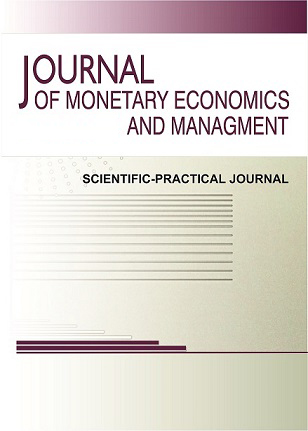студент
сотрудник
В современных условиях цифровой трансформации эффективное управление знаниями становится ключевым фактором конкурентоспособности бизнеса. Большие языковые модели (LLM) открывают новые возможности для автоматизации процессов поиска, структурирования и передачи знаний внутри организации. В данной статье анализируется влияние LLM на управление корпоративными знаниями, включая ускорение доступа к информации, снижение когнитивной нагрузки на сотрудников и повышение точности принятия решений. Особое внимание уделено экономическим аспектам внедрения LLM: исследуются потенциальные выгоды от сокращения временных затрат на поиск информации, оптимизации адаптации сотрудников и снижения операционных расходов за счет автоматизации рутинных задач. Систематизированы ключевые вызовы, такие как высокая стоимость разработки, риски утечек конфиденциальных данных. На основе анализа существующих исследований и кейсов предложены критерии оценки эффективности LLM в бизнес-среде. Статья содержит обзор современных подходов к интеграции технологии, а также рекомендации по адаптации LLM с учетом специфики организационных процессов. Результаты исследования позволяют сформировать гибкую систему оценки, которая может быть адаптирована для различных отраслей и масштабов бизнеса, а также подчеркивает важность сбалансированного подхода к внедрению, учитывающего как преимущества, так и риски технологии.
большие языковые модели, LLM, управление знаниями, экономическая эффективность, цифровая трансформация, генеративный искусственный интеллект, автоматизация, риски внедрения искусственного интеллекта
1. Дудихин В. В., Кондрашов П. Е. Методология использования больших языковых моделей для решения задач государственного и муниципального управления по интеллектуальному реферированию и автоматическому формированию текстового контента // Государственное управление. Электронный вестник. – 2024. – № 105. – С. 169–179.
2. Зеленков Ю. А. Управление знаниями организации и большие языковые модели // Российский журнал менеджмента. – 2024. – Т. 22, № 3. – С. 573–601.
3. Столяров А. Д., Абрамов А. В., Абрамов В. И. Генеративный искусственный интеллект для инноваций бизнес-моделей: возможности и ограничения // Beneficium. – 2024. – № 3. – С. 43–51.
4. Alavi M., Leidner D. E., Mousavi R. Knowledge Management Perspective of Generative Artificial Intelligence (GenAI) // SSRN Electronic Journal. – 2024. – С. 1–25.
5. Benbya H., Strich F., Tamm T. Navigating Generative Artificial Intelligence: Promises and Perils for Knowledge and Creative Work // Journal of the Association for Information Systems. – 2024. – Vol. 25, № 1. – С. 23–36.
6. Brynjolfsson E., Li D., Raymond L. R. Generative AI at Work // NBER Working Paper Series. – 2023. – No. 31161. – P. 1–65. – Режим доступа: https://www.nber.org/papers/w31161. – Дата обращения: 15.06.2025.
7. Dell’Acqua F., McFowland III E., Mollick E. R., Lifshitz-Assaf H., Kellogg K., Rajendran S., Krayer L., Candelon F., Lakhani K. R. Navigating the jagged technological frontier: field experimental evidence of the effects of AI on knowledge worker productivity and quality // SSRN Electronic Journal. – 2023. – С. 1–58.
8. Godest F., [и др.]. Enhanced LLM for Smart Knowledge Management in Nuclear Industry // Proceedings of the 24th International Conference on Knowledge Engineering and Knowledge Management (EKAW 2024). – Amsterdam: Science and Technology Publications (SCITEPRESS), 2024.
9. Grabuloski M., Karadimce A., Sefidanoski A. Enhancing Language Models with Retrieval-Augmented Generation: A Comparative Study on Performance // WSEAS Transactions on Information Science and Applications. – 2025. – Vol. 22. – С. 272–297.
10. Hindi M., [и др.]. Enhancing the Precision and Interpretability of Retrieval-Augmented Generation (RAG) in Legal Technology: A Survey // IEEE Access. – 2025. – Vol. 13. – С. 46171–46189.
11. Kostka A., Chudziak J. A. Synergizing Logical Reasoning, Knowledge Management and Collaboration in Multi-Agent LLM System // Proceedings of the International Conference on Artificial Intelligence and Knowledge Systems. – Tokyo: Tokyo University of Foreign Studies, 2024. – С. 203–212.
12. Кузьминов Я., Кручинская Е. Оценка возможностей GenAI для решения профессиональных задач [The Evaluation of GenAI Capabilities to Implement Professional Tasks] // Foresight and STI Governance. – 2024. – № 4 (18). – С. 67–76.
13. Kraus S., Jones P., Kailer N., Weinmann A., Chaparro-Banegas N., Roig-Tierno N. Digital Transformation: An Overview of the Current State of the Art of Research // Sage Open. – 2021. – Vol. 11, № 3. – С. 1–15.
14. Kudryavtsev D., Khan U., Kauttonen J. Transforming Knowledge Management Using Generative AI: From Theory to Practice // Proceedings of the 16th International Conference on Knowledge Management and Information Systems (KMIS 2024). – Porto, Portugal: Science and Technology Publications (SCITEPRESS), 2024. – С. 362–370.
15. Kwon B., Park J., Lee S. Large Language Models: a Primer for Economists // BIS Quarterly Review. – 2024. – С. 37–52.
16. Mariotti L., Guidetti V., Mandreoli F., Belli A., Lombardi P. Combining Large Language Models with Enterprise Knowledge Graphs: a Perspective on Enhanced Natural Language Understanding // Frontiers in Artificial Intelligence. – 2024. – Vol. 7. – Article 1460065
17. McKnight M. A., McDonald P., O’Reilly P. Generative Artificial Intelligence in Applied Business Contexts: a Systematic Review, Lexical Analysis, and Research Framework // Journal of Applied Business and Economics. – 2024. – Vol. 26, № 2. – С. 119–131.
18. Nguyen L. T. K., Connolly J., Nguyen H. N. A Systematic Review of Improving Knowledge Management with Generative AI and Large Language Models // Journal of Advances in Information Technology. – 2025. – Vol. 16, № 4. – С. 594–612.
19. O’Leary D. E. Enterprise Large Language Models: Knowledge Characteristics, Risks, and Organizational Activities // Intelligent Systems in Accounting, Finance and Management. – 2023. – Vol. 30, № 3. – С. 113–119.
20. Petana G., Rosa C. Digital Transformation and the Impact in Knowledge Management // Proceedings of the 12th International Joint Conference on Knowledge Discovery, Knowledge Engineering and Knowledge Management (IC3K 2020). – Budapest, Hungary: Science and Technology Publications (SCITEPRESS), 2020. – С. 180–187.
21. Wahidur R. S. M., [и др.]. Legal Query RAG // IEEE Access. – 2025. – Vol. 13. – С. 36978–36994.
22. Zhang J. Automated Household Food Management and Recipe Recommendation System Based on Visual Recognition and LLM Knowledge Base // Science and Technology of Engineering, Chemistry and Environmental Protection. – 2024. – Vol. 10, № 1. – С. 1–9.
23. Zhou W., [и др.]. The Security of Using Large Language Models: a Survey with Emphasis on ChatGPT // IEEE/CAA Journal of Automatica Sinica. – 2025. – Vol. 12, № 1. – С. 1–26.
24. The State of AI: Global Survey // McKinsey [Электронный ресурс]. – 2025. – Режим доступа: https://www.mckinsey.com/capabilities/quantumblack/our-insights/the-state-of-ai. – Дата обращения: 14.06.2025.









